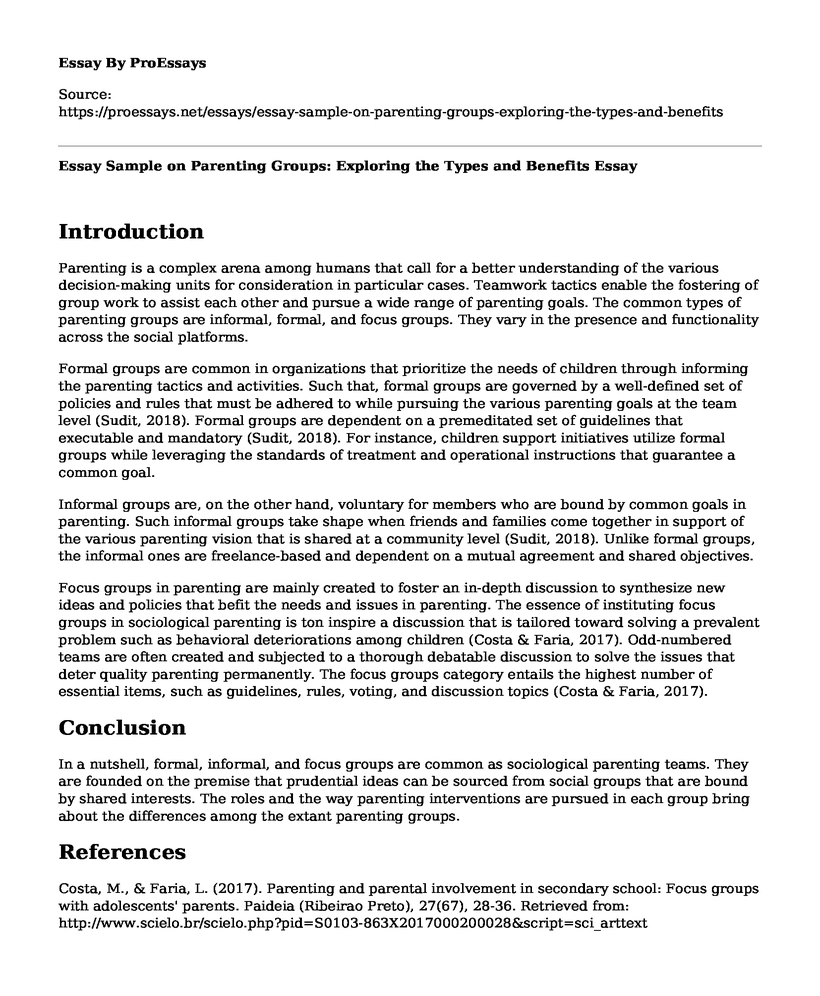Introduction
Parenting is a complex arena among humans that call for a better understanding of the various decision-making units for consideration in particular cases. Teamwork tactics enable the fostering of group work to assist each other and pursue a wide range of parenting goals. The common types of parenting groups are informal, formal, and focus groups. They vary in the presence and functionality across the social platforms.
Formal groups are common in organizations that prioritize the needs of children through informing the parenting tactics and activities. Such that, formal groups are governed by a well-defined set of policies and rules that must be adhered to while pursuing the various parenting goals at the team level (Sudit, 2018). Formal groups are dependent on a premeditated set of guidelines that executable and mandatory (Sudit, 2018). For instance, children support initiatives utilize formal groups while leveraging the standards of treatment and operational instructions that guarantee a common goal.
Informal groups are, on the other hand, voluntary for members who are bound by common goals in parenting. Such informal groups take shape when friends and families come together in support of the various parenting vision that is shared at a community level (Sudit, 2018). Unlike formal groups, the informal ones are freelance-based and dependent on a mutual agreement and shared objectives.
Focus groups in parenting are mainly created to foster an in-depth discussion to synthesize new ideas and policies that befit the needs and issues in parenting. The essence of instituting focus groups in sociological parenting is ton inspire a discussion that is tailored toward solving a prevalent problem such as behavioral deteriorations among children (Costa & Faria, 2017). Odd-numbered teams are often created and subjected to a thorough debatable discussion to solve the issues that deter quality parenting permanently. The focus groups category entails the highest number of essential items, such as guidelines, rules, voting, and discussion topics (Costa & Faria, 2017).
Conclusion
In a nutshell, formal, informal, and focus groups are common as sociological parenting teams. They are founded on the premise that prudential ideas can be sourced from social groups that are bound by shared interests. The roles and the way parenting interventions are pursued in each group bring about the differences among the extant parenting groups.
References
Costa, M., & Faria, L. (2017). Parenting and parental involvement in secondary school: Focus groups with adolescents' parents. Paideia (Ribeirao Preto), 27(67), 28-36. Retrieved from: http://www.scielo.br/scielo.php?pid=S0103-863X2017000200028&script=sci_arttext
Sudit, A. (2018). Formal and Informal Parental Involvement and Children's Academic Achievement. Fullerton, CA: California State University, Fullerton. Retrieved from: http://search.proquest.com/openview/820cb6a3fc553069fb85eec316781fe7/1?pq-origsite=gscholar&cbl=18750&diss=y
Cite this page
Essay Sample on Parenting Groups: Exploring the Types and Benefits. (2023, Feb 12). Retrieved from https://proessays.net/essays/essay-sample-on-parenting-groups-exploring-the-types-and-benefits
If you are the original author of this essay and no longer wish to have it published on the ProEssays website, please click below to request its removal:
- Essay on Dulce Pinzon: The Real Story of the Superheroes
- Classification Essay Sample on Informal Fallacies
- Essay Sample on Capitalism and Race
- Essay Sample on Disparities Among the Minority and Criminal Justice
- Literary Analysis Essay on Romeo and Juliet: A Reflection of Today's Evil Society
- Communication: A Path to Self-Development and Growth - Essay Sample
- Essay Example on Who Owns a Child? Exploring the Debate on Paternity Fraud Laws







